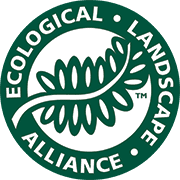Ecological Landscapers are professionals who have an understanding of natural systems — geology, climate, soils, plants, and ecology. They incorporate this knowledge with landscape design, construction, and maintenance to make ecologically sound decisions for your property.
An ecological landscaper differs from a conventional landscaper through the approach, techniques, and products used while managing the soil, plant life, and landscape. They strive to create gardens in an environmentally responsible way with a goal to improve and enhance the site conditions for both humans and wildlife alike.
An ecological landscaper begins with a study of the entire site, including:
Plant Inventory — Cataloging the plants that exist on the site, including exotic invasive plants
Site Location — Evaluating the hardiness zone, topography, microclimate, exposure to wind and sun, and availability of water
Soil Samples — Looking at pH test, soil composition, texture, moisture retention, and fertility
Site History — Accessing recurring problems in the landscape, wet areas, stressed plants, erosion, past and present pest problems
Ecological landscapers use data from their site analysis to provide a design that is appropriate for the site. They will build healthy soil and choose plants that will grow and thrive, selecting for disease resistance, drought or wet tolerance, and non-invasiveness.
To minimize the use of toxic chemicals (whether synthetic or organic), an ecological landscaper will proactively monitor plant material and soils for key pests and diseases that arise in stressed situations. Problems are addressed on a case-by-case basis using the solution with the least negative environmental impact.
Listen for these terms when interviewing a landscaper:
- Soil tests
- Site analysis
- Integrated pest management
- Compost as soil amendment
- Endophytically enhanced grass seed
- Mulches of leaf mold or compost
- Low impact solutions
- Least toxic pesticides
- Exotic invasive plants
Products used by an ecological landscape professional:
- Insecticidal soap
- Horticultural oil
- NEEM
- Bt
- Compost tea
- Beneficial nematodes
- Low nitrogen fertilizer
- Electric chainsaws, mowers, etc.
You can connect with an ecological landscape professional in your area by using the Find An Eco-Pro tool on the ELA website.

